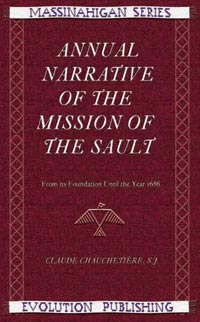The quote from Carol Ross that inaugurated this blog was taken from a brief 4 1/2 minute news piece that North Country Public Radio did in 2000 entitled "Meet the Masters: Mohawk Choir of St. Regis". The news piece is still available online on the NCPR wepage (follow the link above).
You can also hear some authentic Mohawk chant in the background done by the St. Regis choir. The news piece starts out with the Mohawk Sanctus or "Holy, Holy, Holy": "Saiatatokenti, Saiatatokenti. Saiatatokenti. Niio Se8ennio Sabaoth..." It appears to be a similar setting (or perhaps the same setting) as the one for the Mass of the dead in Cuoq's Book of the Seven Nations (p. 17). There is also a second hymn or chant that I haven't yet identified.
Saturday, May 13, 2006
My quest to learn (Ecclesiastical) Mohawk
Over the past few months, I've been trying to teach myself Mohawk. Now I've dabbled a bit in Delaware, but I haven't really ever delved into the meat of learning a Native language because...well, to be frank, I didn't see much of a point in it for me personally. We *do* have professional linguists who study these kinds of things after all, and I didn't see me being able to contribute anything new in that regard.
Well over the last few months I've been coming around on that score with the increasing realization that linguists don't generally tend to be well informed on things like liturgical history or Catholic devotional praxis. And one can't reasonably hope to study the native liturgies unless one is prepared to also learn the native languages used in them.
So a few months ago I picked up David Kanatawakhan Maracle's "Let's Speak Mohawk" audio cassette course and have managed to pick up a bit of pronunciation and some basics of the language. Then last weekend, my brother and sister and law graciously rented us a cabin in French Creek State park in Pennsylvania, and I took along a bit of light reading--Cuoq's Tsiatak Nihonon8entsiake (see sidebar) and his Etudes Philologiques, which contains very useful classical-style grammars of Mohawk and Algonquin.
Well over the last few months I've been coming around on that score with the increasing realization that linguists don't generally tend to be well informed on things like liturgical history or Catholic devotional praxis. And one can't reasonably hope to study the native liturgies unless one is prepared to also learn the native languages used in them.
So a few months ago I picked up David Kanatawakhan Maracle's "Let's Speak Mohawk" audio cassette course and have managed to pick up a bit of pronunciation and some basics of the language. Then last weekend, my brother and sister and law graciously rented us a cabin in French Creek State park in Pennsylvania, and I took along a bit of light reading--Cuoq's Tsiatak Nihonon8entsiake (see sidebar) and his Etudes Philologiques, which contains very useful classical-style grammars of Mohawk and Algonquin.
Subscribe to:
Comments (Atom)



